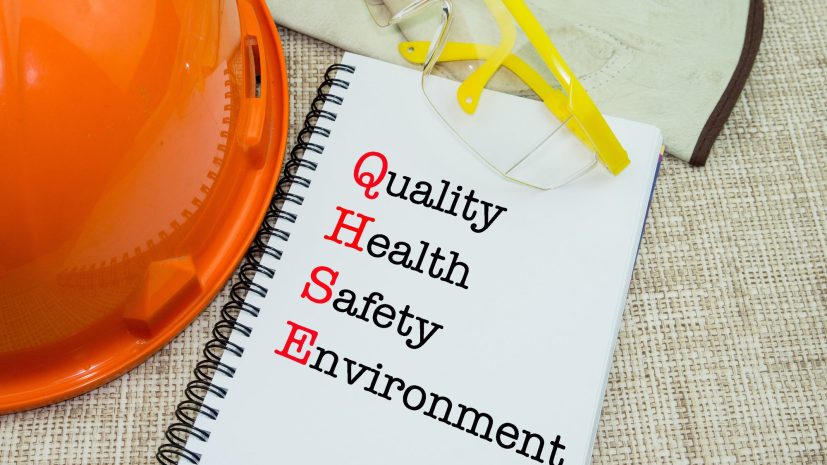What a Technology Partner’s QHSE Vision Should Be for the Energy Market

Posted: May 3, 2023
QHSE (quality, health, safety, and environmental) concerns are a prominent factor in any industry’s operations, but it can be especially critical when it comes to the energy market. For those operating in the oil and gas sector, a problem in any of these four areas risks disastrous consequences.
The high stakes require a commitment to QHSE integrity. As such, there is a wide range of quality management programs and certifications for energy producers to explore to prove compliance—and you should consider all of them. Certifications serve as proof that a company has the necessary expertise and reliable processes.
Let’s explore QHSE, its place in the oil and gas industry, and what regulations and certifications your business should look into. Companies that work in accordance with QHSE regulations and standards—like Gilmore—excel where others fail.
QHSE Concerns for the Oil and Gas Industry
The specifics of QHSE concerns vary from one industry to the next—and even from one company to the next. When it comes to the oil and gas sector, health and safety rank particularly high, due to the life-or-death challenges facing drillers and contractors—think falls, electrical hazards, fires, explosions, and vehicular collisions, among other risks.
The well-known impact of drilling, production, well stimulation, and downhole operations on the environment can’t be left out of the QHSE equation either. With spills and leaks making headlines and impacting ecosystems, oil and gas companies are on high alert. The ongoing trend towards extracting from deeper deposits also applies further pressure on equipment.
Excellence stems from incorporating quality, health, safety, and the environment into every aspect of a company’s processes. That’s why at Gilmore, instead of the conventional approach of just meeting basic obligations, Gilmore integrates QHSE into the entire fabric of our culture. Performance accountability is founded on a process approach with sound management principles contained in the international industry standards ISO 9001:2015, ISO 14001:2015 and ISO 45001:2018 and API Spec Q1, 9th Edition.
Because of our deep commitment to QHSE, you can rest assured that Gilmore components are built to the highest standards. Even under harsh conditions, you can trust the valves to perform safely, protecting profits, the environment, and human well-being.

Why is QHSE Such an Important Consideration?
As mentioned, QHSE stands for quality, health, safety, and environment. These four pillars set a foundational core for responsible organizations; oil and gas companies must apply QHSE concerns throughout the supply chain to ensure long-term operational sustainability.
When a vendor takes the time to embody the values of QHSE, you can be assured that their products live up to exacting standards. Your tech partner has conducted the relevant work, from design and production through assembly and testing.
For example, to solidify our QHSE commitment, Gilmore encourages daily QHSE and compliance moments at the start of each meeting within departments and work groups so that company policies and procedures are reinforced. This keeps priorities fresh in everyone’s minds throughout the workday. Along the same lines, Toolbox Talks and Job Safety Analysis (JSAs) are used to communicate specific work hazards, Personal Protective Equipment (PPE) requirements, and additional precautions prior to work starting.
A newly implemented QHSE database platform can help track risk-related events such as opportunities for improvement, management of change, and supplier performance. Safety-related messaging is displayed throughout the Gilmore facility, and each employee carries the written QHSE policy on their person. All of this is supported by an extensive training program that produces a competent and aware staff who regularly monitor performance. These practices are further backed up by certifications from widely-recognized bodies like the ISO and API.
Key Certifications Your Technology Partner Should Have
So how do you know if your potential partner values QHSE as much as they should? Certification is an important signal. In examining a prospective vendor, evaluate which certifications they have. This documentation tells you they apply strict controls to all products and services, as each certification validates specific requirements within the QHSE framework.
ISO Certifications
The International Organization for Standardization (ISO) publishes various standards that are used globally for many industries, including oil and gas. Verification of these standards is governed by third-party bodies, so you can be sure a vendor’s claim of adherence is well-vetted.
It’s important for a vendor to have ISO certifications—in some cases even required by a contract or law. These standards ensure quality, health, safety, and environmental criteria are met. Gilmore holds multiple ISO accreditations, including ISO 9001:2015, ISO 14001:2015, and ISO 45001.
ISO 9001:2015 is a standard for quality management systems (QMS). This tells you that a company implements rigorous procedures to ensure consistent product output. It’s the most widely used standard of its type, having become a byword for customer satisfaction.
The ISO 14001:2015 standard pertains to environmental management systems (EMS). It helps minimize the ecological impact of oil and gas operations, as well as supporting regulatory compliance. For example, an exploration and production company using parts from an accredited vendor will reduce the risk of leaks.
Tying in with the previous standards, ISO 45001 addresses occupational health and safety. Organizations must protect workers and visitors against accident or illness to receive accreditation.
Together these three ISO standards cover the full range of QHSE.
API Certification
The American Petroleum Institute (API) produces its own range of certifications, more narrowly targeting the oil and gas industry within the United States. As with ISO standards, API certification tells you that an organization has achieved independently-verified requisites.
API Spec Q1 certifies a company’s quality management system specifically for oil and gas manufacturers. The API only issues this certification after conducting an on-site audit, with complete annual audits required to maintain compliance.
Companies with API Spec Q1 and the ISO certifications, such as Gilmore, have proven they can mitigate risk. Their equipment production processes satisfy the stringent demands of drilling.
Maximize QHSE with Gilmore
Quality, health, safety, and environmental concerns will continue to be a priority as the flow control and energy industry tackles new challenges. Staying on top of QHSE is critical to the success of operations, under any business condition.
The most efficient way to ensure that your organization thrives at QHSE is to work with trusted partners. Only a technology partner holding industry certifications can demonstrate their commitment to delivering top-quality products and services.
Gilmore maintains multiple ISO and API certifications. And as a leader in innovation, the company’s dedication to quality extends well beyond industry standards, including extensive staff training, job safety analysis, digital QHSE management tools, and many other initiatives woven into our processes.
“At Gilmore, we are striving for employees to understand that QHSE processes are integrated within everything we do as a company. By taking away the mindset that these processes are extra, special, or only done to meet a requirement we can truly see the benefits of what these processes bring to the organization and ultimately to our customers.” – Taunnya Westbrook, QHSE Manager
Contact Gilmore today to access a quality culture built for the oil and gas industry—and keep operations flowing.




